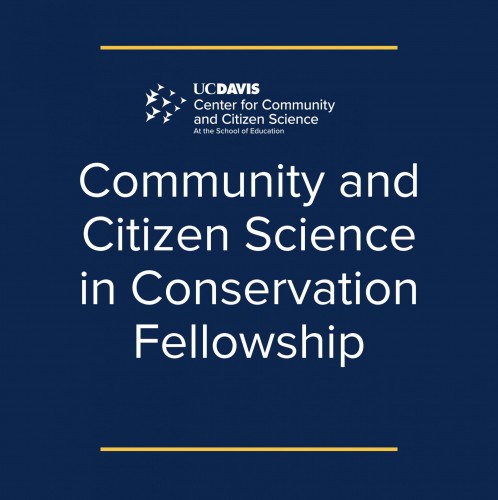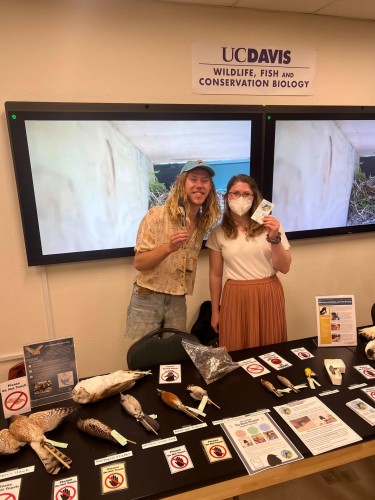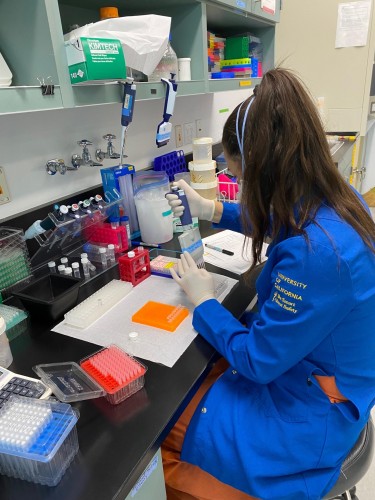CCS Fellowship
MEET OUR 2024 CCSIC Fellows
 We would like to congratulate and
welcome our 2024 Community and Citizen Science in
Conservation Fellows! Our fellows are passionate and dedicated in
community and citizen science, and we are excited to see how
their projects develop and grow. Learn more about the CCSiC
fellowship program here, and be sure to stay
updated with our fellows’ progress throughout the year.
We would like to congratulate and
welcome our 2024 Community and Citizen Science in
Conservation Fellows! Our fellows are passionate and dedicated in
community and citizen science, and we are excited to see how
their projects develop and grow. Learn more about the CCSiC
fellowship program here, and be sure to stay
updated with our fellows’ progress throughout the year.
Meet Our 2023 CCSIC Fellows
 Congratulations to the 2023
Community and Citizen Science in Conservation Fellows! We are
excited about the projects these early career scientists are
pursuing. Each one demonstrates creativity and innovation in
community and citizen science. Learn more about the CCSiC
Fellowship program here, and stay tuned for
more updates from our fellows over the course of the next year.
Congratulations to the 2023
Community and Citizen Science in Conservation Fellows! We are
excited about the projects these early career scientists are
pursuing. Each one demonstrates creativity and innovation in
community and citizen science. Learn more about the CCSiC
Fellowship program here, and stay tuned for
more updates from our fellows over the course of the next year.
Our inaugural 2022 CCSiC Fellows
CCSiC Fellow Spotlight: Cultivating Youth and Community Resiliency
A Community Science Approach to Land Stewardship for Wildfire Mitigation in Maui, Hawaiʻi
Project overview
 In August of last year, I submitted
a proposal to the Citizen Science in Conservation Fellowship
program. This collaborative project is titled “Cultivating Youth
and Community Resiliency: A Community Science Approach to Land
Stewardship for Wildfire Mitigation in Maui, Hawaiʻi”. Through
this project, we seek to address a global environmental and
social issue -wildfire- through a place-based, culturally
responsive, and culturally sustaining, curriculum.
In August of last year, I submitted
a proposal to the Citizen Science in Conservation Fellowship
program. This collaborative project is titled “Cultivating Youth
and Community Resiliency: A Community Science Approach to Land
Stewardship for Wildfire Mitigation in Maui, Hawaiʻi”. Through
this project, we seek to address a global environmental and
social issue -wildfire- through a place-based, culturally
responsive, and culturally sustaining, curriculum.
CCSiC Fellow Spotlight: #iluvbugs! observing backyard biodiversity after dark
Providing a framework for citizen scientists to collect their own data, on their own time, through demonstration and gradual release of responsibility
Backyard biodiversity represents an opportunity for exposure to nature
 Scan your eyes through your backyard
or a city garden and you’ll get a snapshot of a biological
community in time. At first glance, your eyes may alight on a
cluster of colorful flowers or a bumble bee busily moving from
bloom to bloom. With luck, you may see a bird or two snacking on
the unseen arthropods or tiny seeds ferried about by wind or
animal. Much of the biodiversity in your backyard is actively
hiding from you—or your vertebrate peers—through miraculous
camouflage.
Scan your eyes through your backyard
or a city garden and you’ll get a snapshot of a biological
community in time. At first glance, your eyes may alight on a
cluster of colorful flowers or a bumble bee busily moving from
bloom to bloom. With luck, you may see a bird or two snacking on
the unseen arthropods or tiny seeds ferried about by wind or
animal. Much of the biodiversity in your backyard is actively
hiding from you—or your vertebrate peers—through miraculous
camouflage.
CCSiC Fellow Spotlight: Reflections on Project Phoebe
Collaborating with community scientists to understand impacts of urbanization on a songbird species
 Community scientists play an
essential eole in studying urban wildlife. As our world
becomes increasingly urbanized—over half the world’s human
population currently lives in cities, with that percentage
expected to grow to 68% by 2050— cities are often home to
fewer animal species than natural areas. The species that do live
in cities face a variety of challenges that may limit their
survival and reproduction, including
Community scientists play an
essential eole in studying urban wildlife. As our world
becomes increasingly urbanized—over half the world’s human
population currently lives in cities, with that percentage
expected to grow to 68% by 2050— cities are often home to
fewer animal species than natural areas. The species that do live
in cities face a variety of challenges that may limit their
survival and reproduction, including
CCSiC Fellow Spotlight: Learning about coyotes in San Francisco from their scat
 In recent decades, humans and
animals have increasingly co-occurred in high densities in urban
areas. Although declines in biodiversity are associated with
urbanization, numerous species have adjusted to and thrive in
cities. The success of urban animals is largely attributed to the
expansion of their diet to include human-provided food, resulting
in frequent conflicts with people. These conflicts have
wide-ranging financial, health, and ecosystem-level consequences,
necessitating a deeper understanding of organismal adaptation to
human resources.
In recent decades, humans and
animals have increasingly co-occurred in high densities in urban
areas. Although declines in biodiversity are associated with
urbanization, numerous species have adjusted to and thrive in
cities. The success of urban animals is largely attributed to the
expansion of their diet to include human-provided food, resulting
in frequent conflicts with people. These conflicts have
wide-ranging financial, health, and ecosystem-level consequences,
necessitating a deeper understanding of organismal adaptation to
human resources.















